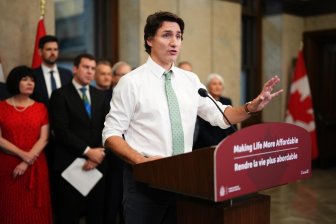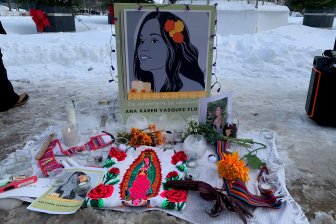Health Canada approved the COVID-19 vaccine for children aged five to 11 years old on Friday, and provinces have already begun booking appointments.

“This is very good news for adults and children alike,” said Dr. Supriya Sharma, a senior medical advisor with Health Canada, at a press conference Nov. 19.
“It provides another tool to protect Canadians, and to the relief of many parents, will help bring back a degree of normality to children’s lives, allowing them to more safely do the things that they have missed during the last 20 months.”
Here are some answers to questions parents might have about the shots.
What are the risks of COVID-19 for children?
Children and youth are less likely to get seriously ill from COVID-19, Health Canada says. But they can still get sick or have the virus without symptoms, spread it to others, and experience long-term effects if they get infected. Children are also susceptible to a rare but serious complication called multisystem inflammatory syndrome in children (MIS-C), where various organs like the kidneys, heart and lungs can become inflamed.
Children with underlying medical conditions might be at higher risk of complications from COVID-19, Health Canada says. Although it’s very rare, some children have died after contracting COVID-19 in Canada over the course of the pandemic.
“We’ve done studies across Canada that have shown that there have been a few hundred kids hospitalized for either acute COVID-19 or multisystem inflammatory syndrome of children, which is a dysregulated immune response that produces a highly inflammatory state,” said Dr. Jesse Papenburg, a pediatric infectious disease specialist at the Montreal Children’s Hospital of the McGill University Health Centre.

Studies have shown that half of kids who end up in the hospital due to COVID-19 had no underlying conditions that predisposed them to severe infection, he added.
Is the vaccine for children different from the adult vaccine?
The Pfizer-BioNTech vaccine, officially known as Comirnaty, is now approved by Health Canada for everyone aged five and up.
However, the formulas are slightly different for the pediatric dose – given to children aged five to 11 – and the adult dose, for people aged 12 and up.
Most importantly, the adult dosage contains 30 micrograms of mRNA, while the pediatric dosage is just 10 micrograms.
There is also some very slight variation between the non-medicinal ingredients in each, for improved stability in the smaller dose. This change is not considered clinically significant, according to Health Canada.

How has it been tested?
After the adult dosage of the Pfizer COVID-19 vaccine was approved, the company began a clinical trial on children under 12. The first participants received their first doses in March 2021.
In the first phase of the study, researchers tested various dosage strengths, eventually settling on 10 micrograms as the best pediatric dose. Then, 2,268 children were randomly assigned to receive either the vaccine or a placebo. The children received two doses, 21 days apart.
The study results were published in the peer-reviewed New England Journal of Medicine.
The study found that beginning one week after the second dose, the vaccine was 90.7 per cent effective at protecting trial participants from COVID-19. No serious side effects were reported in children aged five to 11.
Health Canada independently evaluates study information provided by companies as part of the vaccine approval process and green-lit the Pfizer COVID-19 vaccine for children aged five to 11 on Nov. 19.
What is the recommended dosing schedule?
The National Advisory Committee on Immunization (NACI) recommends that children get two shots, spaced eight weeks apart.
So far, the provinces are following that recommendation.
Should kids get the COVID shot if they've recently had another vaccine?
NACI recommends that children not receive another vaccine, for example a flu shot, for at least 14 days after getting the COVID-19 vaccine. Similarly, they recommend that kids wait at least 14 days to get their COVID-19 vaccine after receiving another shot.
This is mostly so that medical professionals can identify if any adverse reactions are due to the COVID-19 vaccine or something else, as it is introduced across Canada, NACI said.
What are the side effects of the vaccine in kids?
Common side effects in children included redness, soreness or swelling at the injection site, and more general symptoms like fatigue, headache or muscle soreness, according to Health Canada.
These side effects go away after a few days, according to material compiled by the University of Waterloo’s school of pharmacy.
No serious side effects attributed to the vaccine were seen in the trials for young children. Side effects like anaphylaxis and myocarditis are rare, but have been seen in older age groups, according to the University of Waterloo.
The risk of myocarditis or pericarditis, which are inflammation of the heart or tissue around the heart, is much higher if someone catches COVID-19 than with the vaccine, the university said.

Questioning side effects is “totally legitimate for any sort of medical intervention,” Papenburg said.
COVID-19 vaccines are, however, “the most highly scrutinized medical intervention in modern medicine,” he said. In the U.S., nearly three million doses have been given to children aged five to 11 so far, he said.
“To date, all the data are reassuring. There have been no safety signals either from the U.S. CDC or from the FDA.”
If my child has already had COVID-19, should they get vaccinated?
NACI recommends that children who have previously been infected with COVID-19 still get vaccinated.
They should wait for any symptoms to clear up and should be considered non-infectious before getting the vaccine.
I have an 11-year-old child. Should they get the pediatric vaccine or the adult vaccine?
NACI recommends that 11-year-olds receive the pediatric dose of vaccine. If they turn 12 between their first and second doses, they can take the adult vaccine for their second dose.
The University of Waterloo notes that vaccine dosages aren’t based on weight, meaning that just because an 11-year-old might be as big as some 13-year-olds, that doesn’t mean they need the stronger dose. Smaller vaccine doses are often used for children, they said, because children have a stronger immune response than adults.
Pfizer’s research showed that 11-year-olds who received the smaller pediatric dose still had a robust immune response, said Dr. Anna Banerji, a pediatric infectious diseases specialist at the University of Toronto.
Unless the child’s 12th birthday is Jan. 1, she recommends getting him or her vaccinated right away instead of waiting until they are eligible for the adult dose.
“You want to vaccinate people when they’re at most risk and the risk is really now and in the next month or so as we head into the holiday season,” Banerji said.
Will the COVID shot be mandatory to attend school?
So far, no provinces have announced that the COVID-19 vaccine will be mandatory for kids five to 11 to attend school.
How do I get my child vaccinated?
Different provinces will be delivering the vaccine in different ways.
In B.C., vaccinations will start the week of Nov. 29 and parents can pre-register their children online.
Alberta parents can book appointments for their children starting Wednesday and the first shots will be given out Friday.
Saskatchewan parents can book an appointment for their child at provincial clinics now. Vaccines will also be made available in more than 100 school-based clinics.
Manitoba parents can book their kids’ appointments online or by calling 1-844-626-8222.
Ontario’s online vaccine booking portal opened for young children on Tuesday, and various public health units are also offering programs tailored to their region, including at schools, in local hospitals, pharmacies and elsewhere.

Quebec parents can book appointments for their children on the Clic-Santé website now. The first shots could begin as soon as Wednesday in vaccination centres and vaccination in schools will be offered in a week.
Starting Tuesday, New Brunswick parents are able to book vaccines for their children and will begin administering vaccines on Friday. The initial rollout will be to regional health authority clinics but the province expects to add pharmacies soon.
P.E.I. parents can book appointments for public health clinics on the government website or by phone now, and the government plans to eventually also offer it at school-based clinics.
Nova Scotia is expected to announce details of its plan to vaccinate children this week.
Newfoundland and Labrador is allowing parents to book appointments for their children on its website now, for appointments at public health clinics. Schools will also offer the vaccine, with details on that to come.
None of the territories have yet announced their plans for administering vaccines to children aged five to 11.





Comments